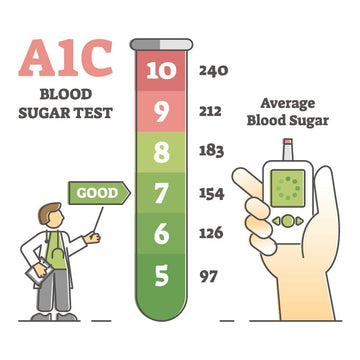How to Naturally Lower Your A1C Levels

Managing blood sugar levels is essential for long-term health — especially if you’re living with prediabetes or type 2 diabetes. One of the most important markers your doctor looks at is your A1C level, which shows your average blood glucose levels over the past 2-3 months.
But here's the good news: you can naturally lower your A1C with the right lifestyle changes. Whether you're newly diagnosed or aiming to improve your numbers, these practical tips can help you take control of your health.
1. Eat Balanced Meals with Low-Glycemic Foods
What you eat has a big impact on your blood sugar. Focus on low-glycemic index (GI) foods that release glucose slowly. This helps keep your levels stable throughout the day.
Great options include:
-
Leafy greens (spinach, kale)
-
Whole grains (quinoa, brown rice)
-
Beans and lentils
-
Berries
-
Nuts and seeds
Avoid refined carbs like white bread, pastries, and sugary drinks — they spike your sugar and sabotage your progress.
2. Stay Active Every Day
Regular physical activity helps your body use insulin more effectively. You don’t need to run marathons — just 30 minutes of moderate exercise a day can make a huge difference.
Try:
-
Brisk walking
-
Cycling
-
Dancing
-
Home workouts
-
Resistance band training
Bonus: Exercise also reduces stress, which is another blood sugar trigger!
3. Stay Hydrated
Water helps flush excess sugar out of your bloodstream and supports healthy kidney function. Aim for at least 8 glasses of water a day, and more if you're active or live in a hot climate.
4. Improve Your Sleep Routine
Did you know poor sleep can raise your A1C? Lack of sleep affects insulin sensitivity and may increase sugar cravings.
Tips for better sleep:
-
Stick to a regular sleep schedule
-
Avoid caffeine late in the day
-
Keep your bedroom cool and dark
-
Limit screen time before bed
5. Manage Stress Naturally
Chronic stress raises cortisol, a hormone that can increase blood sugar. That’s why stress management is a key part of lowering your A1C.
Healthy stress-busters:
-
Meditation or deep breathing
-
Journaling
-
Nature walks
-
Talking to friends or a therapist
6. Consider Natural Supplements
Some supplements may support healthy blood sugar levels. Ingredients like berberine, chromium, cinnamon, and bitter melon have shown promise in studies.
🟢 Important: Always consult your doctor before starting any supplement — especially if you're on medication.
Tip: Explore our A1C Guard natural support formula – designed to help maintain healthy A1C levels alongside a balanced lifestyle.
Final Thoughts
Lowering your A1C doesn’t happen overnight — but small, consistent changes can lead to big results over time. Combine smart eating, regular movement, good sleep, and stress management to give your body what it needs.
Your health is in your hands — and every step counts.





